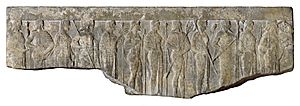Twelve Olympians facts for kids
The Twelve Olympians are the most important gods in Greek mythology. They were believed to live high up on Mount Olympus, a real mountain in Greece. Even though they are called the "Twelve" Olympians, sometimes more than twelve gods were considered part of this group, but never at the same time.
Some gods were always part of the Twelve Olympians. These include Zeus, Hera, Poseidon, Ares, Hermes, Hephaestus, Aphrodite, Athena, Apollo, and Artemis. Other gods like Hestia, Demeter, and Dionysus sometimes took a spot among the Twelve. For example, Hestia once gave up her place so Dionysus could join, because she wanted to live among humans.
The Olympians became the most powerful gods after a big war. They fought against an older group of gods called the Titans. Zeus and his brothers and sisters led the Olympians to victory. Zeus, Hera, Poseidon, Demeter, Hestia, and Hades are all siblings. Most of the other Olympians are children of Zeus, but they have different mothers.
Contents
- Meet the Olympian Gods
- Zeus: King of the Gods
- Poseidon: God of the Seas
- Hera: Queen of the Gods
- Ares: God of War
- Artemis: Goddess of the Hunt
- Hephaestus: God of Fire and Crafts
- Apollo: God of Light and Music
- Hermes: Messenger of the Gods
- Hestia: Goddess of the Home
- Demeter: Goddess of the Harvest
- Aphrodite: Goddess of Love and Beauty
- Athena: Goddess of Wisdom
- See also
Meet the Olympian Gods
Zeus: King of the Gods
Zeus is the most important god of all. He is the powerful ruler of Mount Olympus. Zeus is also known as the god of the weather, controlling lightning and thunder. He once said that if everyone tried to pull him down from the heavens, they couldn't, but he could easily pull them up.
Poseidon: God of the Seas
Poseidon is the god of the oceans and all water. He is almost as important as Zeus. Poseidon is often shown with his trident, a three-pronged spear. He can cause earthquakes and storms at sea.
Hera: Queen of the Gods
Hera is Zeus' wife and the queen of the gods. She is the goddess of marriage and family. Hera is often shown as a majestic and powerful figure.
Ares: God of War
Ares is the god of war and violence. He represents the wild and brutal side of battle. Ares is often depicted wearing armor and carrying a spear.
Artemis: Goddess of the Hunt
Artemis is the goddess of hunting and wild animals. She is also linked to the moon and wilderness. Artemis is often shown with a bow and arrows.
Hephaestus: God of Fire and Crafts
Hephaestus is the god of fire and forging. He is a skilled craftsman and blacksmith for the gods. Hephaestus made many amazing weapons and tools for the Olympians.
Apollo: God of Light and Music
Apollo is the god of light, dance, music, and medicine. He also inspires poems and art. Apollo is often seen with a lyre, a stringed instrument.
Hermes: Messenger of the Gods
Hermes is the quick messenger of the gods. He wears winged sandals and a winged cap. Hermes is also the god of travelers, thieves, and shepherds.
Hestia: Goddess of the Home
Hestia is the goddess of the home and family. She represents the warmth and safety of the hearth. Hestia is known for being peaceful and kind.
Demeter: Goddess of the Harvest
Demeter is the goddess of the earth, wheat, flowers, and plants. She is responsible for the harvest and the growth of crops. Demeter ensures that the earth provides food.
Aphrodite: Goddess of Love and Beauty
Aphrodite is the goddess of love and beauty. She is often described as the most beautiful of all the goddesses. Aphrodite inspires love and desire.
Athena: Goddess of Wisdom
Athena is the goddess of wisdom, the arts, industry, justice, and skill. She is known for her intelligence and strategic thinking. Athena is often shown with an owl, a symbol of wisdom.
See also
 In Spanish: Dioses olímpicos para niños
In Spanish: Dioses olímpicos para niños
 | Claudette Colvin |
 | Myrlie Evers-Williams |
 | Alberta Odell Jones |


